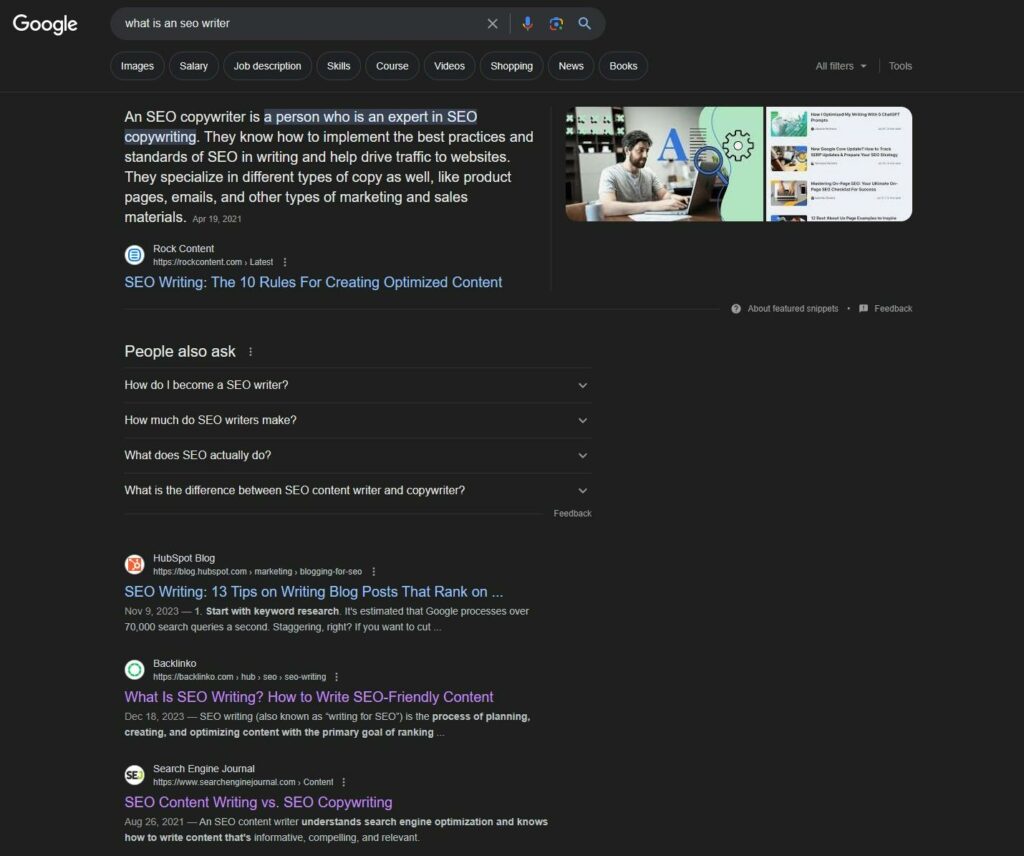SEO Writing: What is an SEO Writer?
-

Aaron Gray
- Blogs
-
 March 21 , 2024
March 21 , 2024
-
 7 min read
7 min read
ANSWER
An SEO writer is a content creator who produces articles and blog posts optimised for search engines. Conventional writers write for human readers, but SEO writers do so for human readers and search engines.
Key Takeaways:
- SEO writing lets content be more discoverable amid the abundance of different kinds of content on the Internet.
- SEO writers are different from SEO copywriters in terms of the content they make, but they can learn and use the same skills.
- The SEO writing process involves a lot of research, not just on the topic but also on the ideal keywords and links to integrate.
Behind our successful link building platform is a huge team of digital marketing specialists, each member responsible for a part of the SEO work pipeline. There’s one group growing our database of high-authority publishers, a separate group for coordinating a client’s preferences with the entire team, and so on. It’s a well-oiled machine that only works if all parts work.
For this post, however, I’d like to focus on the largest group in our company – our content department. Because content is a major element of good SEO, it isn’t unusual for us to be swamped with orders for on and off-page content. This group of SEO writers and editors is responsible for producing fully optimised quality content.
You might think, “So, basically writers, then.” There’s no mistaking they’re writers in every sense of the word, but a world of difference exists between SEO writing and normal writing. Knowing this is important whether you do SEO on your own or hire professional content writing services.
What is an SEO Content Writer?
Writing is a form of expression. We write because we want others to understand something important. We write to share our thoughts with the rest of the world. Anything we write will last far longer than speaking about it, if not forever.

Source: Adobe Stock
SEO content writing adds another reason – to rank in search. After all, how can anyone read your thoughts and opinions if they can’t find it on the Web? As such, a good SEO writer writes for both humans and search engines.
It may sound as if I’m stating the obvious, but keep in mind that search engines speak in code. They require the right keywords and links to understand your content and rank it in the relevant search results. Normal writing doesn’t use target keywords as often because the human reader is capable of understanding context.
Additionally, and this sadly can’t be stressed enough, some SEO writers get carried away by focusing too much on the search engine aspect. They often do this by links or keyword stuffing to the point that the content reads unnatural and may as well be outright spam. SEO exists for the user’s benefit, not the search engine’s.
SEO Writer vs. SEO Copywriter
The distinctions between writing and copywriting also apply to SEO, as explained below.
SEO Writer
|
SEO Copywriter
|
That said, there isn’t much difference in the required skills. Sometimes, SEO writers create original content that contributes to conversion efforts, and copywriters have to place some helpful information on copies to convince people better. For this, both professions need to have extensive, up-to-date knowledge of:
- Writing and SEO best practices
- Conversion copywriting
- Search intent
- Ethical journalism
- Demographic analysis
Steps to Winning SEO Content
This is where it gets tough.
SEO writers are under pressure to create content that ranks well. With multitudes of pages ranking on the Web, even in highly specific niches, generic articles and blog posts won’t be enough to outrank the competition. People-first content always wins, content that answers what most people ask in a clear yet unique manner.
-
Keyword Research
There can’t be on-page and off-page SEO without target keyword research. This process lets SEO content writers know the relevant keywords people commonly look for in search engines and pick the most suitable ones for the write-up they’ll make. Analytics tools like Ahrefs make this step more convenient.

Source: Ahrefs
In most cases, keyword research can also generate topics worth writing about. This saves writers time brainstorming.
-
Search Intent
Each target keyword carries a specific search intent, which shows the kind of results people want when searching for it. Content that differs from the dominant type of content on the search engine results page is less likely to rank high, especially with rich results now a thing.
By understanding user intent, SEO can ensure content aligns with a searcher’s goal, whether they’re looking for information, a specific website, or to complete a transaction.
SEO experts recognise four types of search intent.
- Informational: Users want to be educated or informed about a topic
- Navigational: Users are looking for the exact link to a specific content
- Commercial: Users are comparison shopping between various options
- Transactional: Users want to know how to purchase an item from a brand
Naturally, informational keywords will have articles and blog posts for search results, as they’re the best means of fulfilling users’ need for information. I can get this blog post to rank for the term “what is an SEO writer,” seeing the rest are also blog posts.

-
Creative Infusion
I came across this Tweet (or post) by Ahrefs Content Marketing Director Ryan Law, and I feel every SEO content writer should live by it.

Source: Ryan Law (@thinking_slow on X)
This is where one can separate the wheat from the chaff. It’s easy to spot a rushed piece, from grammatical errors to factual inaccuracies, which can land any brand in hot water. However, one that endeavours to write direct quotes from industry experts and link to research papers and other quality content reads well.
If you’re struggling to think of something, you can use AI tools such as ChatGPT to provide ideas. But whatever you do, NEVER leave the entire writing process to AI. A pair of lawyers tried that last year and paid dearly for it.
-
Outlining
A typical piece has an introduction, body, and conclusion. The first and last ones can be a paragraph or two long, but the body will require an outline to organise the plethora of ideas it’ll contain. It’s also necessary to help writers finish the piece more quickly.
-
First Draft and Revisions
As Ernest Hemingway says, “All first drafts of everything are garbage.” I would’ve wanted to put one of the more strongly-worded versions of his quote, but I need to keep this blog post safe for Web. Moving along…
Good writers know that the first version of their content won’t be up to spec. This post may go through multiple revisions before going live. However, feedback is essential in creating an SEO article or blog post that attracts and engages the target audience, not to mention ensuring the links and keywords read naturally.
-
Title Tag and Meta Description
Title tags and meta descriptions don’t influence search rankings as much as quality content and backlinks. Nevertheless, you’d want to seize every opportunity, even those that give you minuscule chances.
Good titles and meta descriptions contribute to user experience and also assist search engine algorithms in understanding the content. They should have a single mention of the primary keyword and keep the length within the limit to prevent truncation. The limit is 60 characters for titles and 160 words for meta descriptions (including spaces).
A search query (what users type into search engines) often includes secondary keywords related to the main topic. While factors like quality content and backlinks are more important for search engine rankings, optimizing elements like the page title, meta tags, header tags, and image alt text can still give your content strategy a slight edge.
-
Links
The last SEO strategy is to ensure the content has a reasonable amount of quality links – external, internal, and client-provided. Links improve user experience and allow search engines to crawl the linked pages’ good SEO content.

Our Mission: Transforming SEO with Transparency and Trust

Try It Now For Free!
No credit card required. Prefer a demo?
Sign Up
"*" indicates required fields

